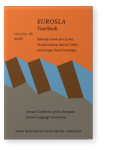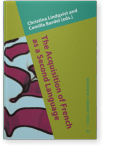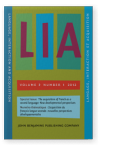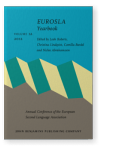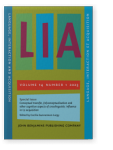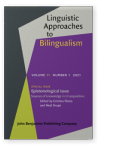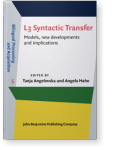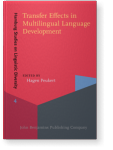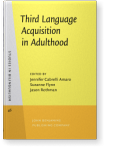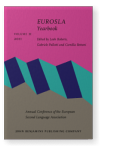Camilla Bardel
List of John Benjamins publications for which Camilla Bardel plays a role.
Yearbook
Titles
The Acquisition of French as a Second Language: New developmental perspectives
Edited by Christina Lindqvist and Camilla Bardel
[Benjamins Current Topics, 62] 2014. v, 168 pp.
Subjects Applied linguistics | Language acquisition | Multilingualism | Romance linguistics
The acquisition of French as a second language: New developmental perspectives: L’acquisition du français langue seconde : nouvelles perspectives développementales
Edited by Christina Lindqvist and Camilla Bardel
Special issue of Language, Interaction and Acquisition 3:1 (2012) vi, 162 pp.
Subjects Cognition and language | Language acquisition | Multilingualism
EUROSLA Yearbook: Volume 12 (2012)
Edited by Leah Roberts, Christina Lindqvist, Camilla Bardel and Niclas Abrahamsson
[EUROSLA Yearbook, 12] 2012. viii, 217 pp.
Subjects Applied linguistics | Language acquisition | Language teaching | Multilingualism
2023 Always trust your gut? A case study on the differential impact of French as L1/L2 on Italian L3 tense-aspect judgments Conceptual transfer, (re)conceptualisation and other cognitive aspects of crosslinguistic influence in L2 acquisition, Gunnarsson-Largy, Cecilia (ed.), pp. 41–74 | Article
The study examines how three undergraduate beginner students of Italian as L3 make sense of Italian tense-aspect morphology based on other languages. All students had knowledge of Swedish, English, and French, in each case acquired in a particular chronological order. The participants completed… read more
2021 Transfer patterns in L 3 learning discussed Epistemological issue: Sources of knowledge in L3 acquisition, Flores, Cristina and Neal Snape (eds.), pp. 50–53 | Commentary
The keynote from Schwartz and Sprouse (2020) starts with an overview of various models of L3 acquisition, with focus on syntax. The authors come to the conclusion that the Typological Proximity Model (TPM) is the model which can explain L3 acquisition development. In this commentary we sort out… read more
2017 Chapter 4. The L2 status factor hypothesis revisited: The role of metalinguistic knowledge, working memory, attention and noticing in third language learning L3 Syntactic Transfer: Models, new developments and implications, Angelovska, Tanja and Angela Hahn (eds.), pp. 85–101 | Chapter
This chapter provides a nuanced view of the L2 status factor model, emphasizing explicit metalinguistic knowledge as the key factor governing transfer, together with individual differences in working memory and the operations associated with it. We argue that individual differences regarding the… read more
2017 Chapter 10. Transfer from an L2 in third language learning: A study on L2 proficiency L3 Syntactic Transfer: Models, new developments and implications, Angelovska, Tanja and Angela Hahn (eds.), pp. 223–250 | Chapter
This chapter addresses the role of proficiency in a prior non-native language (L2 proficiency) on transfer in third language learning. It discusses some methodological considerations and gaps in previous research, while also bringing up conceptual difficulties in defining, operationalizing and… read more
2016 Pointing backward and forward: Be’-prefaced responsive turns in Italian L1 and L2 Discourse Markers in Second Language Acquisition / Les marqueurs discursifs dans l’acquisition d’une langue étrangère: Studies on Italian and French as L2 / Études en italien et en français langues étrangères, Borreguero Zuloaga, Margarita and Britta Thörle (eds.), pp. 89–116 | Article
In this study, we analyze the kind of actions L1 and L2 speakers of Italian perform by prefacing their responsive turns with the discourse marker be’. As a baseline, the article begins with an analysis of how native speakers of Italian use be’. We then carry out quantitative and qualitative… read more
2015 Lexical cross-linguistic influence in third language development Transfer Effects in Multilingual Language Development, Peukert, Hagen (ed.), pp. 111–128 | Article
This chapter is an overview of the study of lexical cross-linguistic influence (CLI) in oral production at different stages of third language development. The character of CLI in the developing vocabulary is illustrated with data from learners of French and Italian as foreign languages in Sweden.… read more
2014 The acquisition of French as a second language: New developmental perspectives The Acquisition of French as a Second Language: New developmental perspectives, Lindqvist, Christina and Camilla Bardel (eds.), pp. 1–6 | Article
2012 The acquisition of French as a second language: New developmental perspectives The acquisition of French as a second language: New developmental perspectives: L’acquisition du français langue seconde : nouvelles perspectives développementales, Lindqvist, Christina and Camilla Bardel (eds.), pp. 1–6 | Article
2012 The L2 status factor and the declarative/procedural distinction Third Language Acquisition in Adulthood, Cabrelli, Jennifer, Suzanne Flynn and Jason Rothman (eds.), pp. 61–78 | Article
This chapter deals with the assumed qualitative difference between the learning of a chronologically true L2 and the subsequent learning of an L3, and the related issue of transfer from L2 into L3. In fact, some recent studies show that L2 can take on a stronger role than L1 as a transfer source in… read more
2011 Developing a lexical profiler for spoken French L2 and Italian L2: The role of frequency, thematic vocabulary and cognates EUROSLA Yearbook: Volume 11 (2011), Roberts, Leah, Gabriele Pallotti and Camilla Bettoni (eds.), pp. 75–93 | Article
This study is a follow-up to Lindqvist et al. (to press), where we investigated lexical frequency profiles of learners of French and Italian at different proficiency levels. By analyzing the proportion of low-frequency words used by the learners, we could distinguish proficiency levels that differ… read more
